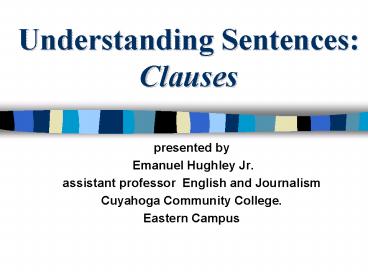Understanding Sentences: Clauses - PowerPoint PPT Presentation
1 / 11
Title:
Understanding Sentences: Clauses
Description:
To build a sentence, a writer uses phrases and clauses as building blocks. ... Example: Climbing Mount Everest was his lifelong ambition. ... – PowerPoint PPT presentation
Number of Views:136
Avg rating:3.0/5.0
Title: Understanding Sentences: Clauses
1
Understanding SentencesClauses
- presented by
- Emanuel Hughley Jr.
- assistant professor English and Journalism
- Cuyahoga Community College.
- Eastern Campus
2
Building a sentence
- To build a sentence, a writer uses phrases and
clauses as building blocks. - Unlike a phrase, a clause is a group of related
words that contains a subject and predicate. - Two kinds of clauses independent and dependent
or subordinate.
3
Independent clauses
- Each independent clause expresses ONE complete
idea. - Can be used alone as a simple sentence.
- Can be combined with other clauses to form other
types of sentences.
4
Independent clauses
- Example Climbing Mount Everest was his lifelong
ambition. - How many complete ideas does this sentence
express? - One.
5
Dependent clauses
- Contain subject and predicate, but do not
express a complete idea because they begin with a
subordinating conjunction. - See textbook for a list of subordinating
conjunctions. - After Before Because
- Although though as soon as
- Unless eventhough while
- That which who (rel. pro)
6
Dependent clauses
- Because they cant express a complete idea by
themselves, dependent clauses must be joined with
an independent clause or some other related words
to express a complete idea. - Dependent clauses function in sentences as
nouns, adjectives or adverbs.
7
Dependent clauses
- Noun clause Whoever wrote this paper should
pursue graduate study in African history. - Who should pursue graduate study?
- Whoever wrote this paper.
- Whoever wrote this paper is a noun clause.
- This clause answers the questions Who? What,?
Whose? or To whom?
8
Dependent clauses
- Noun clause The White House knows that military
spending is out of control. - What does the White House know?
- That military spending is out of control.
9
Dependent clauses
- Adjective clause The surgery was performed by
the surgeon who developed the procedure. - Which surgeon performed the surgery?
- The surgeon who developed the procedure.
- This clause answers the questions Which one? How
many? What kind?
10
Dependent clauses
- Adverb clause Jessica paints more carefully
than I usually do. - How much more carefully does Jessica paint?
- More than I usually do.
- This clause answers the question Why? When?
Where? How?
11
Dependent clauses
- Recognizing dependent clauses is important for
two reasons. - Enables you to avoid making the mistake of
writing a sentence fragment. - You can learn to use them to add variety to your
sentence structures.































